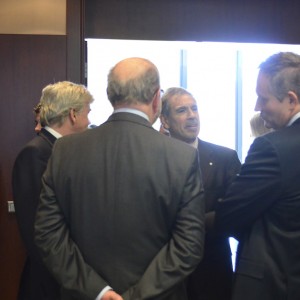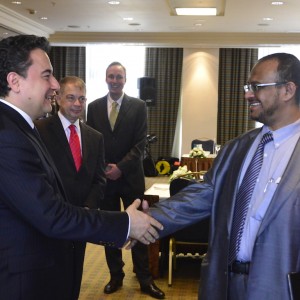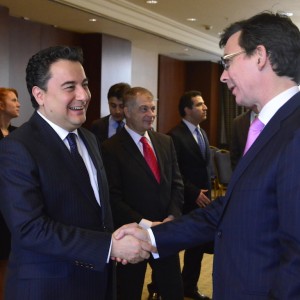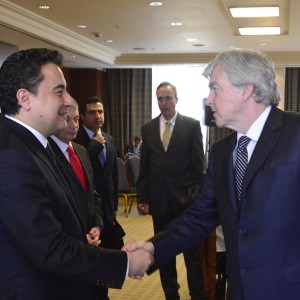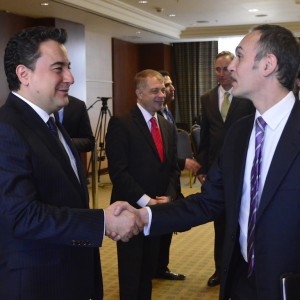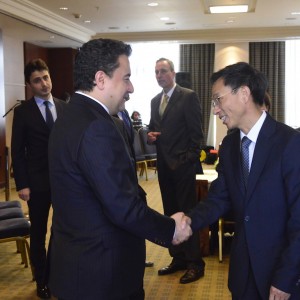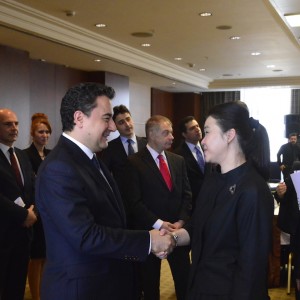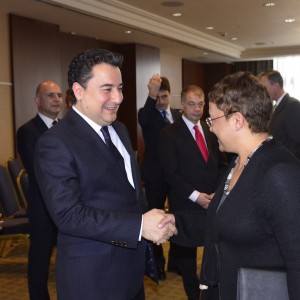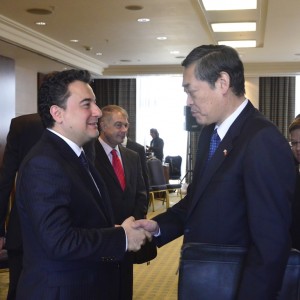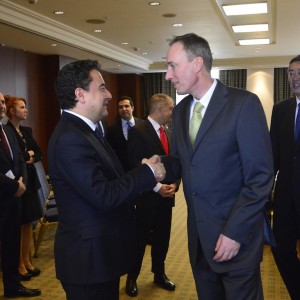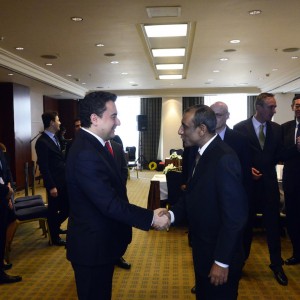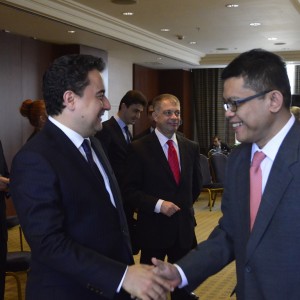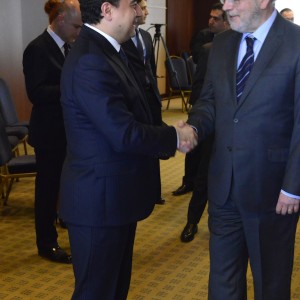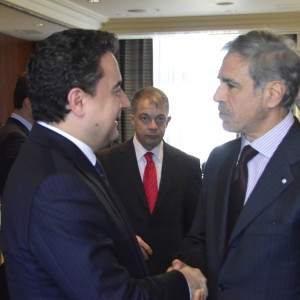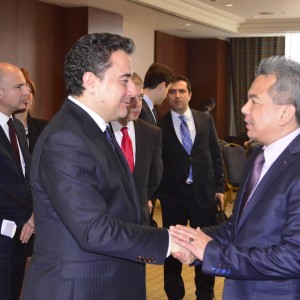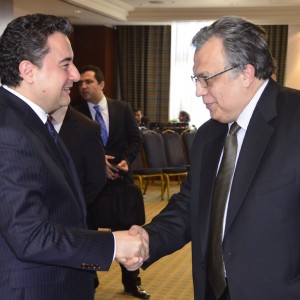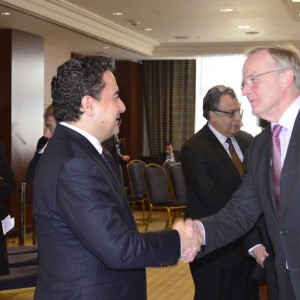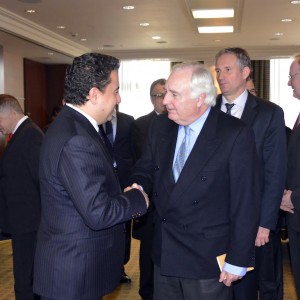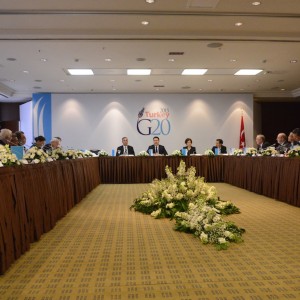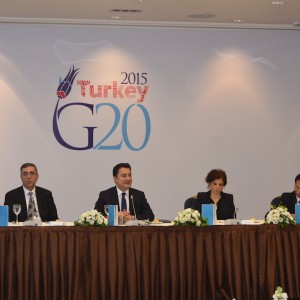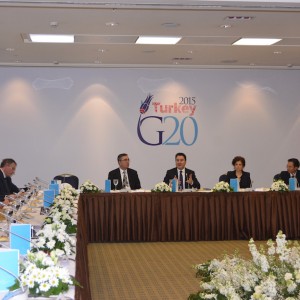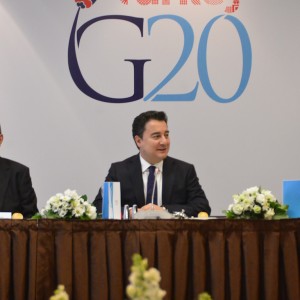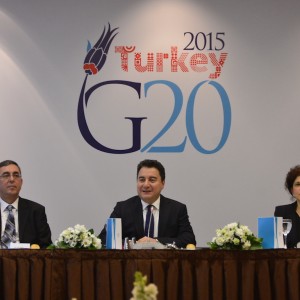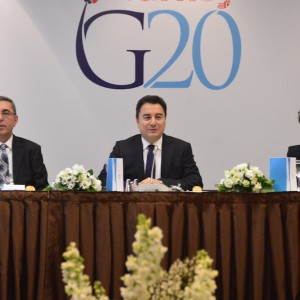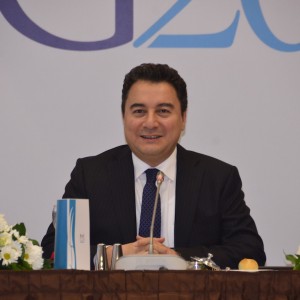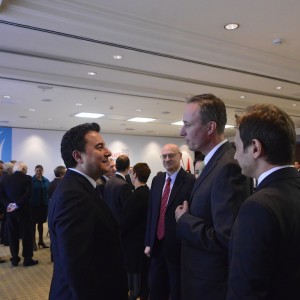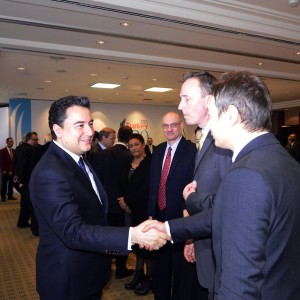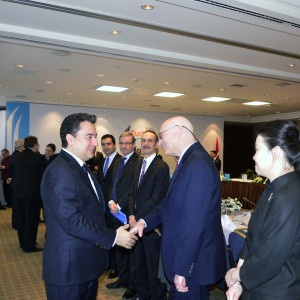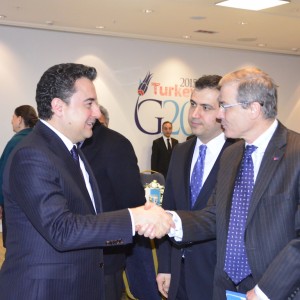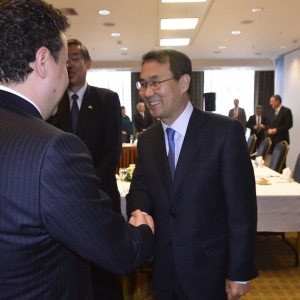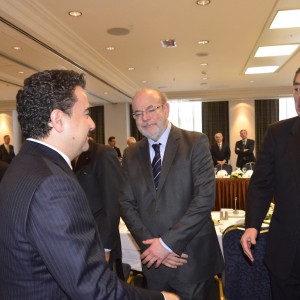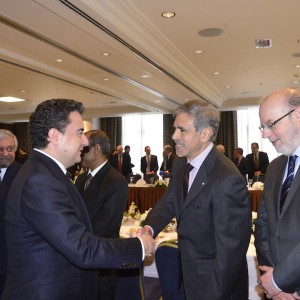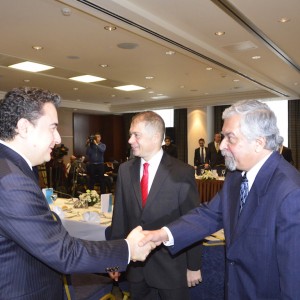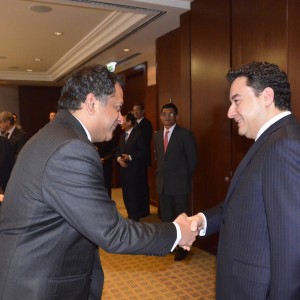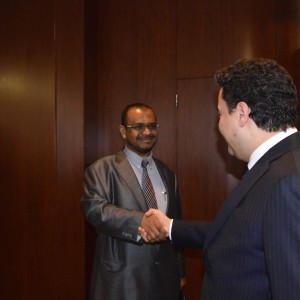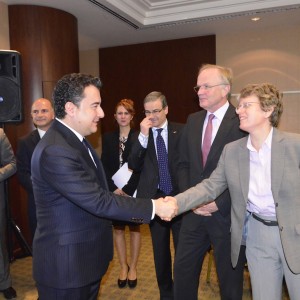Ambassadors, Ladies and Gentlemen, Distinguished Members of Media, you are all very welcome.
Today, we want to have a consultation meeting with the ambassadors and the representatives of the G-20 countries as well as international organizations that are represented around the G-20 table.
As you have been following, we assumed the Presidency of the G-20 in the beginning of December 2014. Our Deputies and Sherpas already met in December for the first time to make the preparations for the whole year and we are going to be having a very first ministerial meeting, the Ministers and Central Bank Governors Meeting in Istanbul, in two weeks from now. We have invited all of our colleagues and I know that most of them will be available to be here. Then we will be having our second ministerial meeting in the margins of the Spring Meetings of World Bank and IMF. Then more meetings will come in different formats, different places, including a G-20 dinner in Peru Lima, because the World Bank, IMF meetings will be hosted by our Peruvian colleagues this year – like every three years other countries are hosting it.
For our G-20 Leaders’ Summit, I would say it is going to take place in Antalya. It will be November 15th and 16th and all of the G-20 leaders as well as the leaders of the international organizations are invited to the event, which will be followed very widely from around the world.
This year, we are going to have not only meetings of Ministers in charge of financial issues and Central Bank Governors but also have ministerial meetings for labor and foreign trade. These are already a tradition. So all the G-20 presidencies have been hosting Labor Ministers meetings and also foreign Trade Ministers meetings. But in addition to these traditional meetings, we are going to be hosting a G-20 Energy Ministers Meeting that will be first ever, and also a G-20 Food and Agriculture Ministers Meeting, because we will be putting a lot of emphasis on access to energy and a lot of emphasis on global food safety issues. Of course when our energy ministers meet, it will not be just access to energy but many other issues around the global energy policies will be discussed around that table.
Our tourism ministers will also meet. The International Tourism Organization has already, I would say World Tourism Organization, that is the full official name, wanted to have a meeting during our Presidency in Turkey and we are going to be also hosting it probably around September, of which the dates are still being discussed. Although that’s not an official G-20 track, it will still be a good idea to do it.
So this is more or less about the format, venue and dates. More detailed information, as soon as it becomes available, is already being distributed to G-20 colleagues.
Maybe I should talk about the content, what we are going to be discussing and what kind of priorities we are going to put forward. First of all, I have to appreciate our Australian colleagues for what they have done – very successful presidency, solid outcome – and our Chinese colleagues, who are going to be taking over from us next year.
G-20 has a Troika mechanism, as you probably all know, where the current presidency, former presidency and next presidency work closer. Although G-20 countries work very close anyway, the Troika work even closer to provide a seamless transition in a way from one presidency to another. Since G-20 doesn’t have a Secretariat, a permanent Secretary structure yet, this Troika mechanism is very instrumental to ensure continuing it.
The agenda items, all the eleven agenda items that G-20 is discussing are all very important and we are going to be carrying this in a concentrated way. But as the Turkish Presidency, we have declared three I’s as our priorities. The first I is about Inclusiveness, the second I is about Implementation and the third I is about Investment.
Starting from the first I: Inclusiveness, what we are going to be concentrating on is especially two subjects, two important subjects. One is more intra-national inclusiveness, the other is more international inclusiveness. When we talk about inclusiveness, it can be brought into wide two sets of policies. One is intra-national, that’s about what we are doing all in our countries to follow more inclusive policies especially on how to have more inclusive growth. And the other one is international, what are we doing globally? Are we just taking care of our own countries or are we also working on the other countries’ needs for good policies? For intra-national perspective of inclusiveness, we will be putting a lot of emphasis on SME’s, small and medium sized enterprises. We believe that employment generation is with SME’s. Large corporations; yes they employ people, but when you look at globally; in many countries lots of employment is generated by small and medium sized enterprises. So, we would like to introduce this concept, SME concept, for all the 11 agenda items. So under every agenda item, we would like to ask ourselves as G-20 countries, what are we doing for SME’s? For example, if it is about financial regulation; are we taking SME’s into account in an adequate way? Or if it is about international trade; are we really taking care of what the SME’s need? Are we working to make them part of the global value chain? So this will be an important subject for us. For SME’s, we have also talked with ICC, International Chamber of Commerce, to launch a World SME Assembly or World SME Alliance, which means that for the first time we would like to build a global voice for SME’s. International Chamber of Commerce have membership in more than 100 countries worldwide, and we thought that it would be a right organization for this purpose to have the voice of private sector but especially SME’s globally. The talks are still continuing but I would expect in a few weeks this will be completed and it will be launched during this year, not just for our G-20 presidency, but it will be a permanent platform for the voice of SME’s worldwide.
The second concentration area under the first I, under the Inclusiveness, is Low-Income Developing Countries. “Low-Income Developing Countries” is defined and categorized by IMF, which is slightly larger than LDC defined by UN. The UN has least developed country group and IMF have this LIDC categorization, low-income developing countries categorization. So, we thought that being wider than LDC’s in terms of scope would be a good idea. So, under every G-20 agenda item, we should be asking ourselves what we are doing for low-income developing countries. Are their needs adequately addressed? Are their concerns are adequately covered in the G-20 agenda and the decisions we are working on? So these two will be the most important concentration areas under the Inclusiveness but we have more sub-issues which I don’t want to now get into details. But inclusiveness is going to be a very important aspect throughout the program. When we talk about inclusive growth, of course it has many dimensions, it has all the employment issues, inequality issues, the education, healthcare. It is a very wide area and organizations like World Bank and especially UN and UNDP of course, will be very important to be on board all throughout this year to have a good quality outcome for what we want to do.
The second I: Implementation. We believe that a lot of good policies have been already worked out by G-20 countries and other countries. I think many countries know what is needed, many countries have already announced their structural reform agendas and G-20 countries made about 1,000 commitments for structural reforms. These are reported to G-20 and now implementing these commitments will be very important. So we are working on an implementation monitoring structure so to say, together with OECD and IMF. OECD and IMF, both of them are working on these structural reforms and the impact of these structural reforms on the global growth. They expect that if the G-20 countries implement what they already promised -these 1,000 promises so to say- then the global growth is expected to be about two percent higher than business as usual scenario in about five years’ time. By the way, the first year has already passed, so we have four years left to reach that goal. Also financial regulation and international taxation areas are all very important that implementation should be good to have concrete results.
The third I: Investment. Especially infrastructure investments are also very high in the agenda of G-20 as well as many other countries. This is not just about developing countries, since a lot of developed countries all are also have a need for more investments. Infrastructure needs even in advance world is quite high and especially during times of fiscal discipline, during times of fiscal consolidation, government resources are not always adequate to do it. For those countries which have the fiscal space, maybe it might be a good idea to use that space for infrastructures because if the infrastructures are good projects, if they are well-designed projects, then it is a good way of spending government money, because it helps growth potential to go off, it helps to the productivity of growth in the country. But if the government resources are not enough, so how to involve more private resources in public infrastructure projects? PPP models is also going to be an important study area. For the PPP models; how to standardize them, how to securitize them, how to make the investors understand these models better, so that we will be able to provide more funding to Public-Private-Partnership projects.
So these are more or less our priority areas that that we are going to be concentrated on. As I have said briefly at the beginning, the G-20 agenda is already quite heavy.
There are also some engagement groups that we are working with, one of them is for example, B-20, the Business Interaction Group, the other is L-20, Labor Unions, the voice of work force so to say, we have T-20, the Think-Tanks. There is also Y-20, for Youth and there is C-20, for NGO’s, for Civil Societies so to say. So these are all important engagement groups that we are working with. But we are also now launching a new engagement group, which is W-20, Women 20. We are still working on the concept paper about the exact scope of W-20 and we are discussing this with our G-20 colleagues. We are going to be concentrating more especially on the role of women on business in corporations, or about women entrepreneurships, how to enhance the effectiveness of the women in business world, how to enhance their role so to say.
So this could be an official engagement group, which might be with the consensus of all G-20 countries, or it could be a Turkish Presidency initiative. We are still working to see which way is going to be the better one.
I could talk a little bit more on the global economy and how we see it but probably today the time is not really long enough for us to have a global economy discussion. Maybe I should stop my initial remarks here and welcome you all again. By the way, we are going to a have lunch with the LIDC Ambassadors in Ankara tomorrow, Low-Income Developing Country Ambassadors in Ankara to get their feedback about what they expect and what their ideas are for our G-20 work. If you do also have ideas about LIDC’s, on what G-20 could do for LIDC’s, your input of course is going to be very important for us.
So thank you all.

